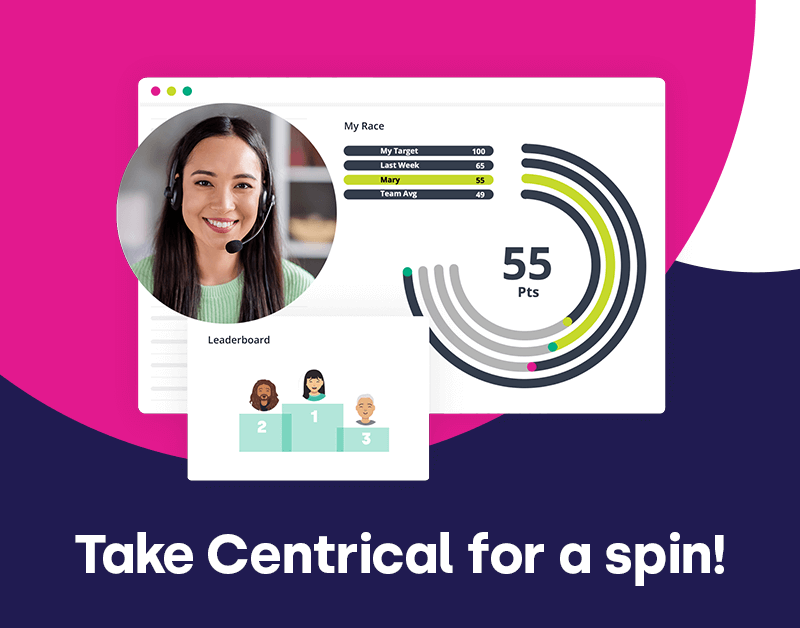Coaching isn’t just for athletes – it is also a key element in call center success. But supervisors often have large teams, with differing skills, strengths, and weaknesses. Additionally, some teams might be remote, which can make it tough to build rapport and trust. This article will dive into different call center techniques and methods, including call center coaching basics and benefits, common challenges, and some key takeaways.
Benefits of Call Center Coaching
There are many benefits of call center coaching (which are amplified with the right call center coaching techniques and methods). Enhanced agent performance is one key benefit. Call center coaching helps to empower agents and develop and refine their skills, leading to overall improved performance.
Call center coaching also boosts morale. When coaches provide guidance, support, and opportunities for skill development, this enhances agent job satisfaction and leads to higher morale and reduced attrition rates. Other benefits that stem from improved agent performance and morale are consistency in service quality, better alignment with organizational goals and compliance requirements, better quality assurance scores, and ultimately, improved customer satisfaction and loyalty.
Finally, call center coaching encourages a culture of continuous improvement, where agents and supervisors work together to refine processes and best practices.
6 Essential Call Center Coaching Techniques with Examples
There are many call center coaching techniques – below are a few of the most common:
One-on-One Coaching: Individual coaching sessions where supervisors provide personalized feedback and guidance to agents. (Example: a supervisor reviews a recorded customer interaction with an agent, highlighting where the agent excelled and areas needing improvement. They discuss strategies for handling challenging customer situations more effectively.)
Role-Playing: Agents engage in role-playing scenarios to practice handling different customer situations and challenges. (Example: Two agents simulate a difficult customer call, with one playing the customer and the other playing the agent. The supervisor observes and provides feedback on the agent’s communication, problem-solving, and conflict-resolution skills.)
Self-Assessment and Goal Setting: Agents evaluate their own performance and set improvement goals in collaboration with supervisors. (Example: An agent self-assesses by rating their performance on key metrics, such as call handling time and first-call resolution. They then work with their supervisor to create a development plan to meet specific goals.)
Side-by-Side Coaching: Supervisors sit alongside agents during customer interactions, providing real-time guidance. (Example: A supervisor listens in on a live call with an agent and sends helpful suggestions via instant messaging. The agent can adjust their approach based on the real-time feedback.)
Peer Coaching: Experienced agents coach and mentor newer colleagues. (Example: A senior agent helps a new team member learn how to navigate the call center’s knowledge base to address common customer inquiries quickly and effectively. Peer coaching can include sharing best practices and offering support.)
Gamification and Competitions: Turning coaching into a friendly competition or game to motivate agents. (Example: Creating a competition where agents earn points for meeting specific performance targets, and the agent with the highest score at the end of the month receives recognition or rewards.)

6 Practical Call Center Coaching Methods with Examples
We’ve shared some different call center coaching techniques. Below are a few tried-and-true call center coaching methods to help you and your team make the most of each session:
Be Prepared: The more prepared the coach, the more meaningful and effective the discussion. Make time to gather and review metrics, talking points, recorded interactions, and a potential improvement goal/plan before the session.
Be Specific: Just telling agents they need to improve isn’t going to get results. Make your expectations clear. Instead of saying that the agent must improve their average hold time, it is more helpful to say that the agent should try for an x% improvement over a specific timeframe, and determine what training is needed to help make that improvement happen.
Layer the Positive and Opportunities: When coaching agents, don’t just focus on what is wrong and needs improvement – also highlight what the agent is doing right. Start off on a positive note, citing something the agent does well and from there, go to the negative aspect, following up with how this area can be improved. We also recommend taking time to simply congratulate agents for improved performance, or just for a job well done.
Keep it One-to-One: Ideally, coaching sessions should be kept 1-1 to help avoid any self-consciousness on the part of the agent and enable a candid, open discussion. However, a team coaching session is fine for general, widespread issues (but stick to the overall issue and don’t call out individuals.)
Engage the Agent: Try to find the root cause behind poor performance. Take a human-centric approach and ask about how the agent is doing as a person, how their workload is, or if there is anything they find challenging. Consider inquiring about any non-work issues that you could help with (but don’t push if the agent is reluctant to share).
Be Consistent: Inconsistency in call center coaching can lead to inconsistency in performance. While supervisors will have different styles, and agents will respond to different methods, having standard elements (clear expectations, specific goals, engaging agents, personalizing the sessions, etc.) will go a long way. Additionally, we recommend that supervisors collaborate and share their own best practices and tips for better, more productive sessions.
Key Metrics for Monitoring
There are many areas where call center coaching should focus. Below are some of the most monitored metrics that can improve from call center coaching:
- Average Handling Time (AHT)
- First-Call Resolution (FCR)
- Customer Satisfaction (CSAT)
- Net Promoter Score (NPS)
- Adherence to Schedule
- Service Level (SL)
- Abandonment Rate
- Occupancy Rate
- Wrap-Up Time
- Average Speed of Answer (ASA)
- Emotional Intelligence

Overcoming Common Challenges
Like everything else, call center coaching and team management comes with its own set of challenges. Below are a few common challenges, and some solutions to help overcome them:
Challenge: Time Constraints
With large teams, a long to-do list, and low bandwidth, it can be tough for supervisors to schedule enough time for one-to-one coaching sessions. One solution is to implement software that delivers AI-powered coaching insights to help supervisors more easily identify opportunities and prioritize who to coach and who to recognize.
Challenge: Continuous Improvement
When initial coaching goals are achieved, it can be hard to keep the momentum going. This is where a culture of continuous improvement comes in. Encourage ongoing learning and development by recommending training sessions for upskilling, cross-skilling, and career development. Also, celebrate individual and team achievements to reinforce the importance of continuous improvement.
Challenge: Monitoring Progress
Agent performance data may or may not be readily accessible – and it might not readily reflect the entire story. Look for a platform that provides quick access to real-time employee performance data (including quality assurance scores) from across your operational systems. This helps cut down on admin time and helps managers conduct just-in-time coaching sessions.
Challenge: Maintaining Morale and Engagement
Coaching is often associated with poor performance and can cause anxiety and a general feeling of low morale. Address this by coaching not just for the negative – be sure to schedule coaching sessions to highlight what agents are doing well, and coach to help them keep up the great work. We also recommend making the coaching sessions interactive and engaging, with agents contributing their insights and experiences to the conversations. No matter the topic, connect coaching goals to personal and professional development to enhance motivation.

Watch the Centrical platform in action with a quick preview.
Meet Centrical — #1 Performance Management Gamification Platform
Centrical’s connected Employee Performance eXperience Platform provides a complete solution that includes every required capability to support call center coaching and following up with the next best actions, including augmented coaching capabilities, AI-powered targeted microlearning, real-time performance visibility, advanced gamification, and quality management process enhancement. Centrical also has new generative AI capabilities to support automated training content creation.
Summary and Key Takeaways
Call center coaching is an important element of any call center’s operations, with a variety of call center coaching methods and techniques to choose from for the right approach. Below are a few key takeaways:
- Call center coaching benefits include more knowledgeable and empowered agents, consistency in service delivery, increased morale, and improved employee performance.
- There are many call center coaching techniques, with common approaches that include role-playing, one-on-one coaching, self-assessments and goal setting, side-by-side coaching, gamified competitions, and peer coaching.
- Recommended call center coaching methods include being specific about expectations and improvement, engaging the agent during sessions, being consistent, and highlighting the positive aspects of the agent’s performance.
- Call center coaching has its own set of challenges (which can be remedied with the right approach and technology) such as time restraints, maintaining morale and engagement, and creating a culture of continuous learning.
For over a decade, Centrical has helped leading organizations across the globe improve call center coaching methods and techniques for improved agent motivation, engagement, and performance. Watch the Centrical platform in action with a quick review and request your personalized overview today!
Engage and motivate your frontline teams
Improve performance with an AI-powered digital coach
Deliver world class CX with dynamic, actionable quality evaluations
Boost performance with personalized, actionable goals
Nurture employee success with the power of AI
Listen and respond to your frontline, continuously
Drive productivity with performance-driven learning that sticks
Drive agent efficiency, deliver client results
Keep tech teams motivated and proficient on products and services while exceeding targets
Maintain compliance while building customer happiness and loyalty
Enlighten energy teams to boost engagement
Engage, develop, and retain your agents while driving better CX
Improve the employee experience for your reservations and service desk agents










 Madeleine Freind
Madeleine Freind
 Natalie Roth
Natalie Roth Linat Mart
Linat Mart












 Doron Neumann
Doron Neumann Gal Rimon
Gal Rimon Daphne Saragosti
Daphne Saragosti Ella Davidson
Ella Davidson Ariel Herman
Ariel Herman Ronen Botzer
Ronen Botzer